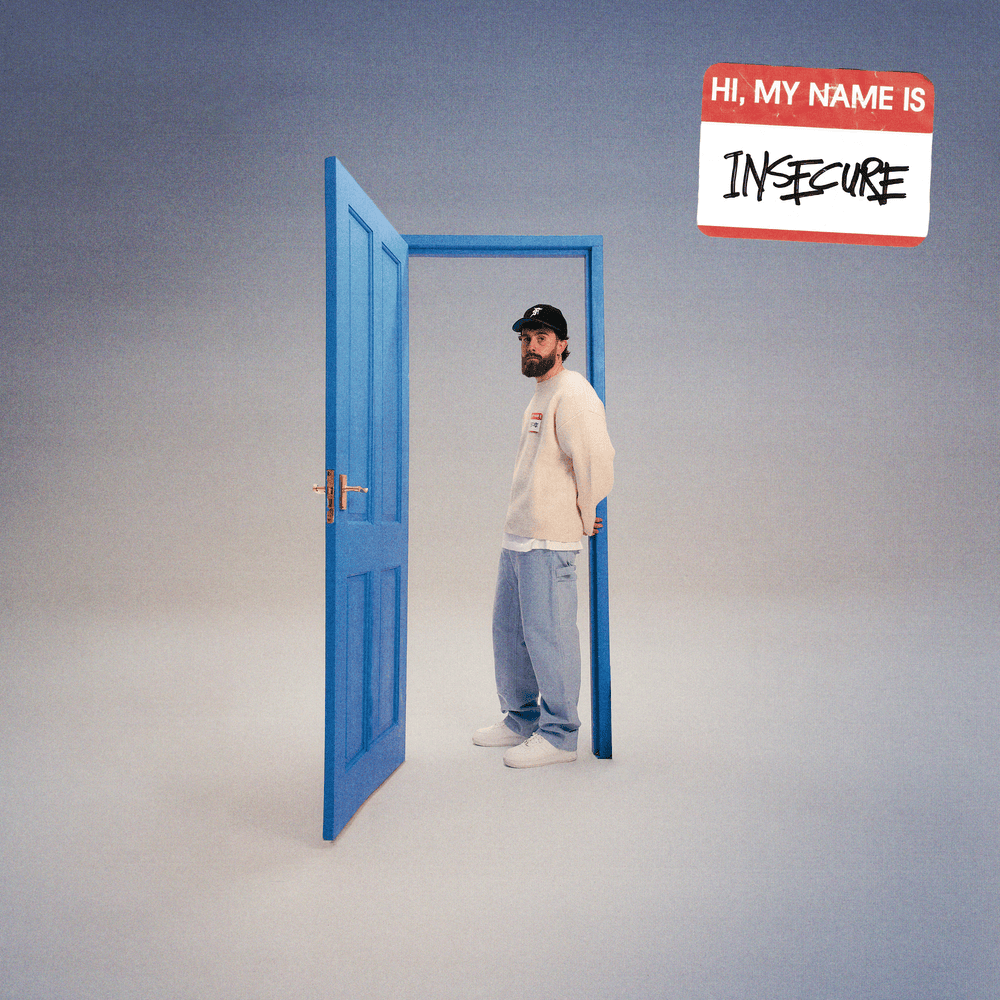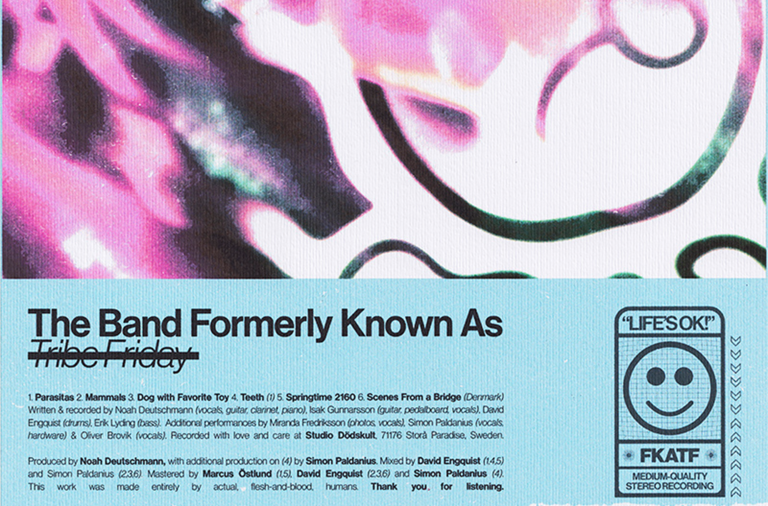During a recent °1840 press conference, we had the opportunity to dive into the journey behind Sam Tompkins’ debut album, hi, my name is insecure, which was released on July 26th. Sam shared stories from his early days of busking to signing with Island Records. He reflected on how his friends, mentors, and family were important in shaping his music, and how his first album purchase left a lasting impact on him.

The album’s message, “a problem shared is a problem halved,” underscores Sam’s intention to connect with listeners on a personal level. Drawing from his own experiences, documented in his phone’s notes app, Sam crafted songs that are both deeply personal and universally relatable. The album’s production aims for a bigger, more uplifting sound, designed to create powerful live experiences. hi, my name is insecure is an invitation to find comfort and connection in shared struggles.
Sam’s debut album, hi, my name is insecure, opens with its dreamy, self-titled track, setting the tone for the album’s vulnerability. A calm guitar melody underpins “Hi, My Name is Insecure,” as Sam’s lyrics expose raw emotions: “I don’t like parties I’d rather die, People love to assume I’m not so shy.” The track feels like a confession, as he navigates insecurities with quiet honesty.
Following this, ‘dead to me’ offers a calm yet biting reflection on betrayal. Originally intended for another artist, Sam kept it for himself, and it’s clear why—there’s something deeply personal about its lyrics. “You stole my heart like a thief, Then buried it six feet deep” he sings, the soft melody contrasting with the bitterness of the words, especially when the song transitions into a more rap-like verse.
One of the album’s emotional highs is ‘phones in heaven,’ a song about loss that resonates with profound depth. After losing his father, Sam channels his grief into this track, which he connects with most at the moment. The uplifting chorus carries the weight of wanting to reach out to someone who is no longer there: “I’m losing my common sense, Thinking that you’ll call, Like there’s phones in heaven.”
‘lose it all’ shifts to a love song, where a tender piano arrangement accompanies Sam’s fears of losing someone he loves. With lines like, “Tell me why they say grown men can’t cry,” Sam strips away masculine stereotypes to reveal his vulnerability. The soaring chorus, where his voice reaches impressive heights, is a genuine love dedication that lingers long after the song ends.
‘almost killed me’ is a stirring portrayal of emotional turmoil after a breakup, yet it’s uplifting from the outset. “Love was the thing that almost killed me,” he sings, managing to express his hurt in a way that allows the listener to feel the intensity of his emotions without sinking into despair. This combination of pain and hope is masterful.
‘then there was one’ is a raw and relatable reflection on regret and loneliness. Sam taps into the all-too-familiar feeling of self-sabotage in relationships, capturing the sting of being left alone after it all falls apart.
Next, ‘die for someone’ introduces a more upbeat, anthemic sound, tackling the desire for genuine connection but the struggle to take action. With its uplifting energy, Sam sings about his yearning to fall deeply in love, all while grappling with his own barriers to vulnerability: “I wanna die for someone, And find somebody to lose my head in.”
The bridge of the next song ‘numb’ stands out as he pleads, “Won’t somebody take this pain, And make it all just go away.” It’s an anthem for anyone who has ever felt overwhelmed by their own thoughts. In Sam’s voice, you can hear his longing for emotional numbness, which feels painfully real.
In ‘all my everything,’ Sam navigates the difficult terrain of personal identity and the strain it places on a relationship, while “someone else” delves into the heart-wrenching reality of unreciprocated love.
‘time will fly’ shifts to a reflective, almost autobiographical tone. Sam traces the fleeting nature of time and the inevitable challenges we all face. The lyric, “You’re gonna meet some new friends, but one’ll die,” is very straightforward, acknowledging how loss and change are a natural part of life. It feels like a personal mantra for anyone navigating life’s unpredictable journey.
‘see me’ emerges as one of the most raw and emotionally charged songs on the album, addressing Sam’s struggle with body dysmorphia. Sam opened up about how he wrote the song after a life coaching session, where the topic came to the surface. The vulnerability in lines like, “What if you see me the way that I see me?” conveys the deep fear of being judged for physical insecurities.
‘thanatophobia’ offers a quiet, introspective moment in the album. The gentle guitar sets the tone for a conversation about an extreme fear of death, but the focus isn’t on dying itself. Instead, Sam reveals in the chorus, “I’m not scared of going under… I’m scared of losing you.” The song revolves around the fear of losing a loved one more than the fear of death itself. The line, “I don’t expect you to feel the same way as me,” speaks to the personal nature of these fears, while the calm delivery makes the song feel like an intimate conversation between lovers, offering comfort in its honesty.
Close to the end of the album ‘thank god you talked to me’ stands out as a light, romantic ode to the importance of seizing moments of connection.
In ‘more than me,’ Sam grapples with the delicate balance between loving someone else and maintaining a sense of self. The chorus, “I think I love you more than me,” reveals the internal conflict of giving so much of oneself in a relationship that self-care takes a backseat. The song captures the tension between devotion and self-preservation, offering a tender yet cautionary tale about the need for balance in relationships.
The album’s thematic exploration of self-worth, vulnerability, and fear comes to a close with ‘alone at the party,’ a song Sam says is personally tied to the album’s cover art. During the press conference, Sam explained how the cover art recalls the lyric, “Yeah, you’re alone at the party but at least, you left the house,” from this track. The focus is on the importance of taking the first steps, no matter how difficult. The song itself speaks to social anxiety and the feeling of isolation even in crowded spaces. The chorus offers a bittersweet affirmation that, while the protagonist may feel disconnected, the simple act of showing up is a victory in itself. It resonates deeply with anyone who has ever struggled to engage socially, while offering the reassurance that small acts of courage matter.
Sam initially wrote around 250 songs for this album, meticulously narrowing it down to the 16 tracks that just felt like they belonged. Each song on the album represents a unique chapter of his journey, tied together by a strong sense of emotional honesty and vulnerability. As if that weren’t enough, Sam has been teasing some exciting upcoming collaborations (possibly even with Teddy Swims – who knows). But we have more to look forward to, as he heads to the US and Canada to support Myles Smith on tour before embarking on his own UK and European tour in November and December.
Written by: Justine Kostka
Edited by: Shanna Henselmans



